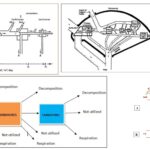Sourav PanLv 9October 23, 2024
What is the Role of Cyclins and Cyclin-Dependent Kinases (CDKs)?
What is the Role of Cyclins and Cyclin-Dependent Kinases (CDKs)?
Please login to save the post
1
Please login to submit an answer.
Sourav PanLv 9May 15, 2025
Cyclins and cyclin-dependent kinases (CDKs) are essential components of the cell cycle regulatory machinery, orchestrating cell division and ensuring proper progression through different phases. Their interplay is crucial for maintaining cellular homeostasis and preventing abnormal cell proliferation, which can lead to diseases such as cancer.
- Cyclins:
- Definition: Cyclins are a family of proteins that regulate the cell cycle by activating CDKs. Their levels fluctuate throughout the cell cycle, rising and falling in sync with specific phases.
- Types: Various cyclins correspond to distinct phases of the cell cycle, including:
- Cyclin D: Functions during the G1 phase, promoting progression through the G1/S checkpoint.
- Cyclin E: Activates CDK2 to facilitate the transition from G1 to S phase.
- Cyclin A: Associated with the S phase and helps in DNA replication.
- Cyclin B: Activates CDK1, essential for the transition from G2 to M phase.
- Mechanism of Action: Cyclins bind to their respective CDKs, causing conformational changes that activate the kinases. This activation enables the phosphorylation of target proteins necessary for cell cycle progression.
- Cyclin-Dependent Kinases (CDKs):
- Definition: CDKs are a group of serine/threonine kinases that, when activated by cyclins, phosphorylate specific substrates involved in cell cycle progression.
- Structure: CDKs possess a conserved catalytic domain, and their activity is regulated not only by cyclins but also by phosphorylation and interaction with other regulatory proteins.
- Role in the Cell Cycle: Each CDK-cyclin complex functions at specific checkpoints:
- CDK4/6-Cyclin D: Promotes progression through the G1 phase by phosphorylating the retinoblastoma protein (Rb), leading to the release of E2F transcription factors that promote S phase entry.
- CDK2-Cyclin E: Facilitates the initiation of DNA synthesis in S phase.
- CDK1-Cyclin B: Triggers the events of mitosis, including nuclear envelope breakdown and chromatin condensation.
- Regulation of CDKs:
- Cyclin Availability: The levels of cyclins fluctuate, regulating the activation of CDKs.
- Phosphorylation: CDKs are often subject to inhibitory phosphorylation. For instance, CDK1 is phosphorylated at a specific tyrosine residue (Y15) to inhibit its activity until conditions are suitable for mitosis.
- Cyclin-Dependent Kinase Inhibitors (CKIs): These proteins, such as p21 and p27, bind to CDK-cyclin complexes to inhibit their activity, serving as critical regulators to prevent premature cell cycle progression.
- Checkpoints and Cyclin/CDK Interactions:
- The interplay between cyclins, CDKs, and checkpoint mechanisms ensures that the cell only proceeds to the next phase of the cycle when conditions are favorable.
- For example, if DNA damage is detected, p53 can activate CKIs, which inhibit CDK activity, thereby halting cell cycle progression until the damage is repaired.
- Implications in Cancer:
- Dysregulation of cyclins and CDKs can lead to unrestrained cell division and tumorigenesis. Overexpression of specific cyclins or mutations in CDKs can contribute to the development and progression of various cancers.
0
0 likes
- Share on Facebook
- Share on Twitter
- Share on LinkedIn
0 found this helpful out of 0 votes
Helpful: 0%
Helpful: 0%
Was this page helpful?




